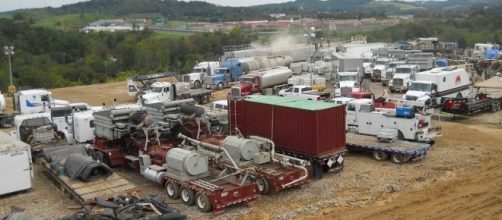It’s becoming increasingly difficult trying to determine #Hillary Clinton and #Donald Trump’s stance on fracking after recent comments the candidates gave on the stump and in interviews. Hillary has said on numerous occasions that she supports a local community’s right to ban fracking even if the state doesn't. She made this part of her campaign’s platform during the town hall debates and rallies. She also said she would regulate fracking even more even though it's already under a suffocating blanket of state and federal rules.
Changing positions mid-stream
But now Clinton says only states should have the right to ban fracking and not local governments. Meanwhile, Trump had previously said only states should ban fracking, but told reporters on Friday he also believes that local communities should have the right veto it as well. Trump made his remarks while in Denver, where Colorado’s supreme court ruled that only the state can ban fracking, not local municipalities.
Hillary And Trump Swap Positions On Fracking https://t.co/kpbFLONDSz pic.twitter.com/7fnPjpdqJ4
— The Daily Caller (@DailyCaller) August 7, 2016
Cities taken off life support
Why either candidate would want to relinquish who can frack to local governments is puzzling.
In states that have embraced fracking, they have seen unemployment drop, tax revenues go up, and cities on the brink of death come back to life. According to a new report, since fracking began in earnest a little over a decade ago, over a million jobs have been created. It has also brought down electricity prices, lowered gasoline prices, and reduced carbon dioxide (CO2) emissions that are believed responsible for any global warming.
The estimated amount of natural gas contained in the Marcellus shale bed in Pennsylvania is enough to power and heat every home in the country for the next century. And further down in the Utica formation, geologists estimate there is enough natural gas to power the country a further 100 years.
And because homeowners own the land rights beneath their ground to the center of the Earth, they get paid for every cubic foot of fossil fuel that is extracted.
The high school that fracking built
One member of Hillary Clinton’s presidential campaign is Congressman Chris Carney (D-PA), who is a big proponent of fracking. In his hometown of Dimock, he says that fracking has turned his community around and “transformed the lives” of farmers and landowners, bringing in much-needed tax revenue into local and state coffers. So much so that it built the town’s new high school. He noted that the country is “awash in so much energy,” we could actually be energy independent in a decade.
.@DailyMail "Black gold rush in the USA by #fracking has slashed the country's energy bills and created 1 mio #jobs" https://t.co/JINDX2bDjQ
— Ulrike Schopp (@onlineschopp) August 8, 2016
Carney adds that fracking also provides cheap energy and isn’t the “double-edged sword” that anti-fossil fuel activists would have people think.
So it’s all the more surprising the Democratic Party removed fossil fuel energies from their platform’s policy paper. They instead opted to support only renewables (which may explain why director James Cameron’s climate change infomercial was shown at the DNC). Contrast that to the Republican Party’s policy paper that supports an all-of-the-above energy strategy.
More fracking means less CO2
There is one downside to fracking. Because oil and gas prices have fallen so dramatically, many of the employment gains have been eroded away. Analysts say it will be temporary as the industry stabilizes. And instead of being one of the heaviest CO2 emitters, the U.S. has seen a reduction of CO2 emissions by one billion tons annually.

